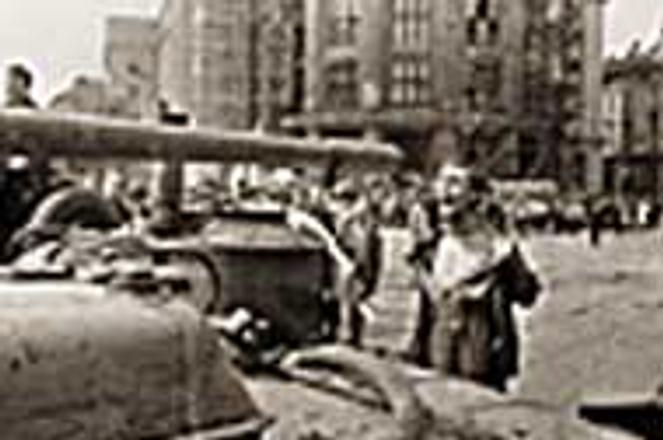The 1968 Warsaw Pact invasion on Bratislava's Šafárikovo námestie. Troops were invited by leading communist figure Vasil Biľak, who was charged on March 30 by the Bratislava Prosecutor General of committing high treason against the Czecho-Slovak state.photo: TASR
A decade after the fall of communism, Slovakia is set to hold its first trial against one of the six communist leaders who signed an official letter of invitation to the Soviet armed forces to enter Czechoslovakia in 1968. After the Prague Spring demonstrations were crushed by the Warsaw Pact troops, the leaders of the national communist government launched their period of 'normalisation', forming one of the most oppressive communist regimes in the former Eastern Block.
Vasil Biľak, the former secretary general of the Slovak Communist Party, was formerly charged by the Bratislava Prosecutor General on March 30 on counts which include high treason against the state. Accused of travelling to Russia to hand-deliver the infamous letter of invitation to Soviet President Leonid Brezhnev, Biľak could face 15 years in prison if convicted.
Far behind its neighbours in terms of officially dealing with its communist past, Slovakia must forge ahead with the charges, head representatives of the Slovak judiciary said, so that long-overdue justice might finally be achieved. However, the Slovak citizenry is divided on the issue, as some say that legal bodies should focus more on the problems of modern-day Slovakia instead of digging up old wounds. Others insist that Biľak must be punished in the name of the thousands of innocent Slovaks persecuted and executed under the Communist regime.
"Biľak participated in the foreign armed forces intervention of our sovereign state," said Daniel Lipšic, Head of Office at the Justice Ministry. "This is the biggest crime in the past 50 years of our history."
Efforts to document Communist-era crime against the citizens of Czechoslovakia have resulted in a collection of files outlining over 70,000 cases. Marián Gula, head of the documentation department at the Slovak Justice Ministry said that his department had uncovered evidence of "more than 3,000 clergy who were sent to camps [so as to separate the religious leaders from their faithful], more than 28,000 'politically unreliable' citizens who were sent to work in forced labour camps, and some 6,900 people, mainly from Eastern Slovakia, who were deported to Russia from 1945 to 1953. In addition about 300 people were shot dead at the western border when attempting to flee Slovakia for freedom in the West."
Despite the documentation, however, not all Slovaks are convinced that charging Biľak is in the country's best interests. "The case will bring nothing good to our society which is already burdened by everyday social problems," said Milan Ištván, a deputy for the reformed communist Party of the Democratic Left (SDĽ). "I believe that this issue has only attracted a marginal amount of attention among the Slovak public."
Biľak was the main ideologist behind the oppressive 'normalisation' policies which took root in Slovakia after the 1968 Prague Spring.photo: Vladimír Hák
Unlike Ištván, Katarína Závacká, the head of the Slovak Academy of Sciences' Theory of Law Section, said that communist crimes must now be investigated and punished. "For all the people who were deported to Russia in the early 1950s, and for those whose property was confiscated, this trial is essential," she said. "Biľak should have been in prison 10 years ago."
Delayed justice
Unlike its neighbours, Slovakia has been slow to pursue the punishment of (let alone the documentation of) communist-era crimes. While other regional countries such as the Czech Republic and Romania have gone to pains to reveal previously hidden secrets of their communist past, Slovakia's efforts have been dubbed lethargic by critics.
Although Justice Minister Ján Čarnogurský created the documentation centre at the Ministry last November, observers noting that the files will for the most part not be used to assist further prosecutions have criticised the usefulness of the centre. "The task of documentation can be left to historians," said Závacká. "If they don't have any legal competence to start a trial against these former communists, what's the point?"
Gula, meanwhile, argued that his centre was providing a more significant public service than just documenting and archiving communist crimes. "We will be initiating legislative changes for the Justice Minister," he said, noting that the centre's efforts would soon result in the former State Police's (ŠTB) files being released to the public.
Gula also responded to criticism against his department by noting that since the fall of communism, different countries had shown different levels of eagerness in dealing with their dark pasts. "Just take the pure facts," he said. "In the Czech Republic, a similar investigative centre was created in 1991 while our centre started just last year from nothing. Also, the Czechs have 100 centre employees while we have two. The problem is that in Slovakia people felt it was not absolutely vital to prosecute these crimes."
Jozef Jablonický, a historian at the SAV's Political Science Department, supported Gula's view and added that for him it was "clear that Biľak and his companions belong in jail." Jablonický said the centre would be "important in dealing with our past, not just as the historian does by evaluating and documenting. It will also be helpful legally so we know who acted against the interests of this country and who initiated or supported the tragedies which were inflicted on thousands and thousands of people by the system."

